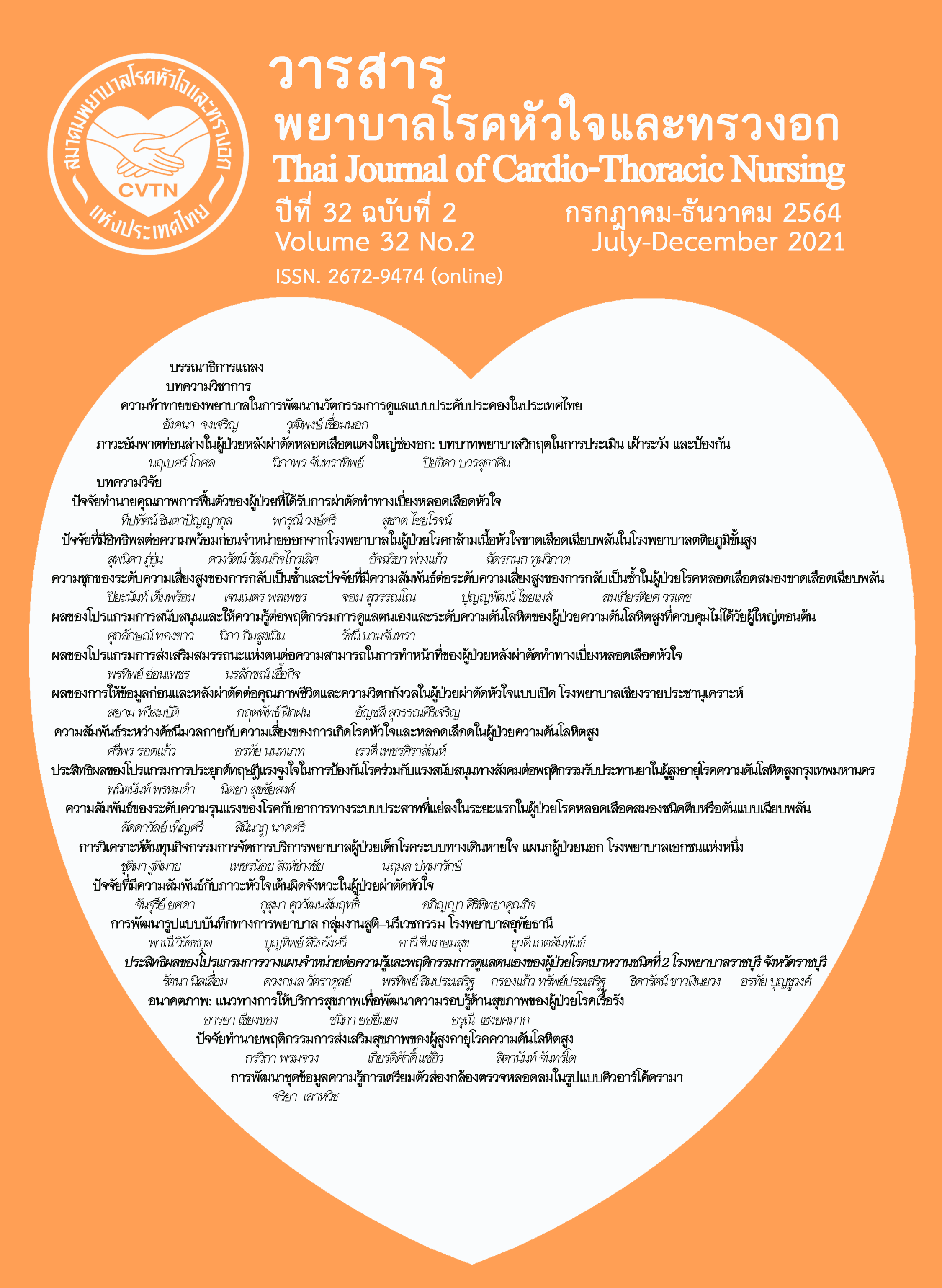The scenarios of health service approaches for improving health literacy in patients with chronic diseases
Keywords:
scenarios, health literacy, healthcare service, patients with chronic diseasesAbstract
The objectives of this research were to study the barriers to develop health literacy in patients with chronic diseases, and to propose the scenarios of health service approaches for improving health literacy that were suitable for their social conditions and expectations. The research implementation applied the future research by using the methodology of Ethnographic Delphi Future Research (EDPR). This research started from identifying barriers to utilize health information by gathering data from patients with chronic diseases who had low scores of health literacy. A health intelligence measurement for patients with diabetes mellitus and hypertension were accessed from 25 patients including three healthcare providers working in the chronic disease clinics at least 10 years. Data from the barriers findings were applied as the main topic for interviewing 20 experts using the EDFR techniques at the first to third rounds. The qualitative data were analyzed using content analysis, while the quantitative data were analyzed using descriptive statistics and interquartile range.
The results showed that the barriers to develop health literacy included 4 domains:1) health knowledge; 2) competency of searching and using health information; 3) negotiation to enhancing self–care; and 4) ability of self-management for controlling and preventing chronic diseases. The future of health service approaches to improve the health literacy for patients with chronic diseases comprised 4 aspects: 1) changing health culture to healthy lifestyle for controlling chronic diseases; 2) supporting accessibility and expanding the distribution of channels for health information exchanges; 4) integrating public health system and education; and 5) developing the strategies of communication between healthcare recipients and providers.
This study suggested that health administrators should apply the evidence from this research to develop policy and implementation plan of health care services for chronic diseases patients in order to improve their health literacy appropriate for self-care and to delay complication from chronic diseases.
References
Division of Non Communicable Disease, Department of Disease Control, Ministry of Public Health. Number of patients, morbidity rate and mortality rate between 2016 and 2019; 2020. [Cited 2020 September 8]. Available from: http://thaincd.com/2016/mission3
American Diabetes Association. 5. Prevention or Delay of Type 2 Diabetes: Standards of Medical Care in Diabetes-2018. Diabetes Care. 2018 Jan 41(Suppl 1): S51-S54. doi: 10.2337/dc18-S005. PMID: 29222376.
Chobanian AV, Bakris GL, Black HR, Cushman WC, Green LA, Izzo JL Jr, et al. National heart, lung, and blood institute joint national committee on prevention, detection, evaluation, and treatment of high blood pressure; National high blood pressure education program coordinating committee. The seventh report of the joint national committee on prevention, detection, evaluation, and treatment of high blood pressure: the JNC 7 report. JAMA. 2003 Jul 9;290(2):197. PMID: 12748199.
Howard DH, Gazmararian J, Parker RM. The impact of low health literacy on the medical costs of Medicare managed care enrollees. Am J Med. 2005;118:371-377.doi.org/10.1016/j.amjmed. 2005.07.002.
Kickbusch I, Allen L, Franz C. The commercial determinants of health. Lancet. 2016; 4:e895–96.
Nutbeam D. Health literacy as a public health goal: a challenge for contemporary health education and communication strategies into health 21th century. Health Promotion International, Printed in Great Britain. 2000;15(3):259–67.
World Health Organization. Health literacy and health promotion. Definitions, Concepts and examples in the eastern Mediterranean region. Individual empowerment conference working document. 7th Global Conference on Health Promotion Promoting Health and Development; 2009 Oct 26-30; Nairobi: Kenya; 2009.
Nielsen-Bohlman L, Panzer AM, Kindig DA, editors; Institute of Medicine (US), Committee on Health Literacy. Health literacy: a prescription to end confusion. Washington: National Academies Press (US); 2004. PMID: 25009856.
Nutbeam D. The evolving concept of health literacy. Soc Sci Med. 2008;67(12): 2072–8. doi:10.1016/j.socscimed.2008.09.050.
Wiratchai N. Advanced research methods and statistics. Bangkok: Chulalongkorn University; 1995. (in Thai).
Poolpatarachewin C. Ethnographic Delphi future research. Journal of Research Methodology. 1986;1(2): 24-33. (in Thai).
Tanasugarn C, Neelapaichit N. The development instrument of health literacy for patients with diabetes mellitus and hypertension. Nonthaburi: Health Education Division, Department of Health Service Support, Ministry of Public Health; 2017. (in Thai).
Macmillan TT. The Delphi technique. The annual meeting of the California Junior Colleges Associations Committee on Research and Development. Monterey, California; 1971.
Chanvanit S. Qualitative data analysis. Bangkok: Chulalongkorn University Press; 2010. (in Thai).
Poolpatarachewin C. Ethnographic Delphi Scenarios Research. Journal of education studies. 2003; 32(1):1-19. (in Thai)
Sorensen K, Van den Broucke S, Fullam J, Doyle G, Pelikan J, Slonska Z, et al. Health literacy and public health: a systematic review and integration of definitions and models. BMC Public Health. 2012;12(80):1-13.
Lhaosupab N, Prueksaanantakal N, Yaprom C, Chiangkhong A. Health literacy for preventing chronic diseases among adults in Bangkok: a case study of conditions for promoting health literacy. Ramathibodi Nursing Journal. 2021; 27(1):122-35. (in Thai)
Chiangkhong A, Duangchan P, Intarakamhang U. Health literacy in diabetic adult: experience of diabetic patient and perspective on health literacy. Kuakarun Journal of Nursing. 2017;24(2):162-78. (in Thai)
Sonart B, Chantaranamchoo N. A Health Literacy Guideline for Health Promotion Behaviors Among Adult Worker Populations in Bangkok and Metropolitan Region. [Master Thesis of Education]. Nakhonpathom: Silpakorn University; 2019. (in Thai)
Sriprasert D. Medical Dominance and the Doctor-Patient Relationship. Thammasat Journal. 2018; 37(1):78-95. doi:10.14456/ tujournal.2018.5 (in Thai)
Bruinessen IR. Barriers and facilitators to effective communication experienced by patients with malignant lymphoma at all stages after diagnosis. Psycho-Oncology. 2013; 22: 2807-14.
Waldrop AP, Meeker MA. Communication and advanced care planning in palliative and end-of-life care. Nurs Outlook. 2012; 60(6): 337-422
Carneiro R, Draxler A. Education for the 21st century: lessons and challenges. Eur. J. Educ. 2008; 43(2) 149-60 doi:10.1111/j.1465-3435. 2008.00348.x
Downloads
Published
How to Cite
Issue
Section
License
Copyright (c) 2022 Thai Journal of Cardio-Thoracic Nursing

This work is licensed under a Creative Commons Attribution-NonCommercial-NoDerivatives 4.0 International License.
บทความนี้ยังไม่เคยตีพิมพ์หรืออยู่ในระหว่างส่งไปตีพิมพ์ในวารสารอื่น ๆ มาก่อน และกองบรรณาธิการขอสงวนสิทธิ์ในการตรวจทาน และแก้ไขต้นฉบับตามเกณฑ์ของวารสาร ในกรณีที่เรื่องของท่านได้ได้รับการตีพิมพ์ในวารสารฉบับนี้ถือว่าเป็น ลิขสิทธิ์ของวารสารพยาบาลโรคหัวใจและทรวงอก






